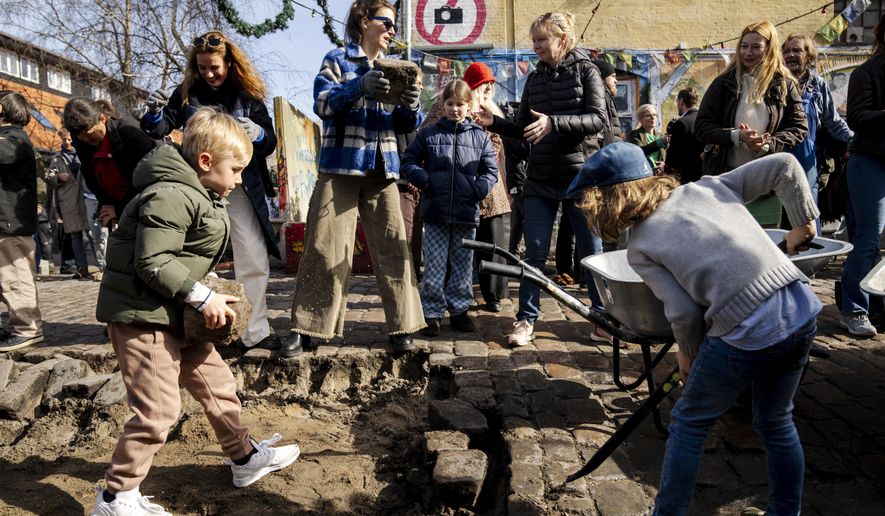COPENHAGEN, Denmark — The now-aging hippies who took over a derelict naval base in Copenhagen more than 50 years ago and turned it into a freewheeling community known as Christiania want to boot out criminals who control the community’s lucrative market for hashish by ripping up the cobblestoned street where it openly changes hands.
Over the years, there have been many attempts to halt the illegal hashish sales which have often ended in violent clashes between criminal gangs and police, with trading then quickly resuming. On Saturday, residents started digging up Pusher Street, after which they can receive government money earmarked for the area’s renovation.
Just after 10 a.m., two children living in Christiania, Emilia and Sally, lifted the first cobblestone from the infamous street in a symbolic move. A large crowd gathered at the scene erupted in applause as the heavy stone was showed around.
Danish Justice Minister Peter Hummelgaard, who was present at the ceremony, said he believes that the excavation of Pusher Street and the individual cobblestones has high symbolic value.
“For more than 40 years, Christiania and the illegal sale of drugs out here has been a huge thorn in the side of the established society,” Hummelgaard told Danish broadcaster TV2. “But now we have reached the point where the Christianians have also had enough of the (criminal) gangs.”
The plan is to create “a new Christiania without the criminal hashish market,” said Mette Prag, coordinator of a new public housing project in the enclave. Prag, who has lived in Christiania for 37 years, likened it to “a village.”
PHOTOS: Christiania, Copenhagen’s hippie oasis, wants to rebuild without its illegal hashish market
“We don’t want the gangsters anymore,” said Hulda Mader, who has lived in Christiania for 40 years. Once the illegal trade is gone, “there might be some people selling hashish afterward, but it’s not going to be in the open.”
After the cobblestones are removed, new water pipes and a new pavement will be laid on Pusher Street and nearby buildings will be renovated. That is the first step in an overall plan to turn the hippie oasis into an integrated part of the Danish capital area, although “the free state” spirit of creativity and community life is to be maintained.
For years, Danish authorities have been breathing down the necks of the downtown community.
In 1971, squatters took over the abandoned military facility and set up a neighborhood dedicated to the flower-power ideals popular at the time of free cannabis, limited government influence, no cars and no police. Since then, successive Danish governments have wanted to close Christiania because of the open sale of hashish, among other things, often leading to tense relations.
To begin with, the residents, called Christianites, disregarded laws by building houses without permits and often ignoring utility bills. Outsiders could only move into the community if they were related to someone already living there.
The residents eventually were given the right to use the land, but not to own it. After more than four decades of locking horns with authorities, they were given control over their homes in 2011, when the state sold the 84-acre (24-hectare) enclave for 125.4 million kroner ($18.2 million) to a foundation owned by its inhabitants. Currently, nearly 800 adults and about 200 children live there, according to Prag, with up to 25% of the residents above the age of 60.
The following year, it was decided to erect public housing for up to 300 people. Construction is expected to start in 2027.
Prag said they want “younger people, more families” to move in who are willing to participate in community activities to keep the spirit of Christiania alive, complete with buildings painted in psychedelic colors and stray dogs.
Over the years, Christiania has become one of Copenhagen’s biggest tourist attractions, a magnet for Danes as well as foreigners. Some come to be offended by the open sale of hashish - authorities for years tolerated the hashish trade on Pusher Street - and others to buy weed. Christiania banned hard drugs in 1980.
In 2004, police began cracking down on drug-related activities - worth millions according to police - controlled by the Hells Angels and the outlawed Loyal to Family. Even when police arrested dealers and fined customers, the illegal sales resumed soon afterward.
In August of last year, drug-related tensions escalated when when a turf war apparently led to a shooting in which one man died and several people were wounded.
Residents also have tried to stop the sales on Pusher Street themselves by tearing down the dealers’ booths, but they mushroomed back. Residents blocked access to the street with huge shipping containers, but masked men removed them.
Fed up with criminals, residents decided in August that something had to be done, knowing that the government had said that getting rid of the organized hashish sales was “an important prerequisite” before Christiania could get 14.3 million kroner ($2.1 million) earmarked for the renovation work.
Now, Christiania hopes that, by inviting ordinary people to come and help dig up Pusher Street, the sales will stop once and for all, and the community can remain an alternative yet legal part of Copenhagen without criminals.
“You can come and have a cobblestone” as a souvenir, Mader said with a smile.




Please read our comment policy before commenting.